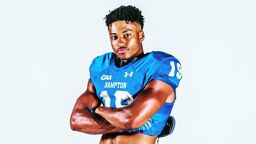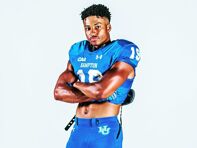Gay players are still “fighting for the right to exist” in men’s team sports, says the first American professional soccer player to come out publicly.
David Testo also believes that closeted players may feel an even greater sense of pressure and discomfort today as a result of Pride Nights and similar initiatives.
Testo played two seasons in Major League Soccer with the Columbus Crew before moving to Canada to continue his pro career with the Vancouver Whitecaps and Montreal Impact.
In November 2011, a month after being released by the Impact, he said in an interview with Radio Canada that he had been out to his teammates and management during his time at the club.
Get off the sidelines and into the game
Our weekly newsletter is packed with everything from locker room chatter to pressing LGBTQ sports issues.
Nearly 13 years later, MLS has expanded to 29 teams and there have been major advances in LGBTQ visibility across pro soccer in North America, such as team Pride nights, the annual “Playing for Pride” fundraiser and special edition jerseys.
However, in all that time, only four more MLS players have come out as gay. In 2013, Robbie Rogers returned from England to play for L.A. Galaxy; in 2015, former San Jose Earthquakes midfielder Matt Hatzke wrote for Outsports about how he had struggled with his sexuality; three years later, Collin Martin shared his truth while with Minnesota United; and in early 2019, former Columbus Crew goalkeeper Matt Pacifici introduced the world to his boyfriend.
For Testo, now 43 and working as a yoga instructor on Vancouver Island, it’s a disappointment that the representation of gay male players like him is still so low.
He believes there will be many worldwide who are “suffering” within their locker room environments.
“They’re always thinking about how they talk, where they look, what other people are saying. They’re not able to have a partner in life that they really love,” he said in an interview with La Presse.
“They’re not able to have the friends and the support that they need.”

Alarmingly, Testo fears that escalating attempts to raise awareness around LGBTQ inclusion could cause a closeted player to retreat further into his shell.
“Things haven’t changed. They may have even gone backwards,” he said.
He describes corporate-led campaigns as a “double-edged sword.” Eye-catching Pride jersey designs or league-wide use of rainbow captain’s armbands resonate well with certain groups, such as players who are strong allies, LGBTQ fans buying merchandise, and senior executives who want to promote their club’s values.
Although Testo sees the value in Pride nights — he attended the dedicated game hosted by CF Montreal last season — he feels that, within a team dynamic, the symbolism can lead to stress and anxiety for those who haven’t yet accepted themselves.
Related


Major League Soccer Commissioner Don Garber tells Outsports he is ‘committed’ to welcoming any gay player
Don Garber has been commissioner of MLS since 1999. He talks with Outsports about watching two gay players come out, and LGBTQ outreach.
By Cyd Zeigler | June 18, 2024
“It makes us feel even more insecure,” says Testo. “Am I going to be singled out? It’s shining a light on the fact that I’m not living my life authentically. It’s even more uncomfortable for the player.”
More recently, there have been incidents of pushback against Pride activations from individuals who are oblivious or ignorant to the effect their snubs would have on a closeted teammate.
Rainbow armbands have been spurned in the Dutch Eredivisie and the Premier League in the last three seasons, while in France’s Ligue 1, players have chosen to sit out games and take the consequences rather than wear jerseys with rainbow shirt numbers or even anti-homophobia messaging.
“The truth is, we’re fighting for our survival. We’re fighting for the right to exist,” says Testo.
“Those who can’t wear the armband are just saying they’re not allies. But what if your best friend on the team doesn’t identify as straight? In a team, that makes it even harder.”
Testo’s view echoes testimonies from other high-profile athletes who have come out in recent years. In his autobiography “My Life On The Line”, written with Outsports’ Cyd Zeigler, former New England Patriots linebacker Ryan O’Callaghan writes about his discomfort as a young player in 2006 to a talk given by Esera Tuaolo, a former NFL player who came out as gay, to fellow new draftees about homophobia in the NFL.
Meanwhile, in soccer, some male players who have since come out as gay or bi have said they have felt uneasy when Rainbow Laces were offered to players in their locker rooms, fearing a negative reaction from teammates or worse.
O’Callaghan stresses in his book that he appreciates the good intentions behind Tuaolo’s talk but that a more worthwhile approach would have been to address sexist or misogynistic language, and the frequency with which his teammates talked about women and “sexual conquests” which made him feel isolated.
Testo’s take on a problem that shows little sign of being solved, at least in soccer, is welcome, particularly for EDI executives at clubs and leagues who are prepared to dig deeper into the effectiveness of campaigns.
He encourages a fresh approach. “If our goal is to win, then we have to want to ease the burden on those who are going through difficult times, so that they can be at the top of their game.”








































